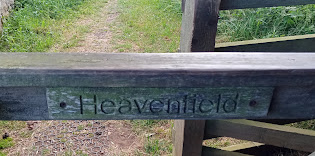Day 1. Heavenfield
'The place is called in English Hefenfelth, meaning the heavenly field, which name bestowed upon it long ago, was a sure omen of events to come, portending that there the heavenly sign could be set up, a heavenly victory won and heavenly wonders shown'. Ecclesiastical History of the English Speaking People, Bede
....And as we arrived in the late afternoon it surely was a heavenly place. Wide blue skies held a bright sun and the meadow grasses, with purple clover and yellow rattle, flanked the mown path from the wooden cross, that commemorates Oswald's faith in God as he went into battle, to the church of St Oswald that stands on the crest of the hill shielded by tall trees.
This marks the end of the St Oswald's Way walk from Lindisfarne to Heavenfield but I feel it should, in fact, be the start of the walk. This is where Oswald returned from exile in Scotland to win a great battle against Cadwalla of Gwynedd, King of the Britons, in 633/634. Cadwalla, after killing two of the previous kings of Northumbria, ruled the 'Northumbrian provinces...as a savage tyrant'.
Whilst in Scotland Oswald had spent time on Iona with the Celtic holy men that travelled from Ireland, and had converted to Christianity. On arriving at Heavenfield he instructed his men to raise a wooden cross and all knelt in prayer. On the night before the battle Oswald apparently had a vision of St Columba quoting the words of God to Joshua; 'Be strong and of good courage, I will be with thee'.
The Battle of Heavenfield was fought at the first light of dawn over a large area and despite being fewer in number Oswald's army was victorious. Cadwalla was killed at a place called Denisesburn, the Brook of Denis, thought to be to the south of Heavenfield and Oswald became King of Northumbria.
There has been a church on this site since the 7th century and as we stood in the church yard looking out across the wide landscapes to the north Oyster Catches called and circled above us. Today it is a place of peace and beauty.
Oswald was a warrior king, a warrior saint, who through his faith brought Christianity to Northmbria and as Bede wrote....
'If history relates good things of good men, the attentive hearer is excited to imitate that which is good'






Comments
Post a Comment